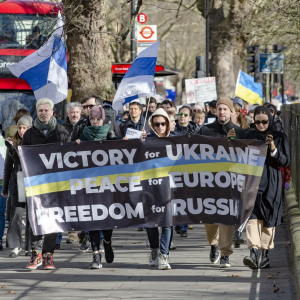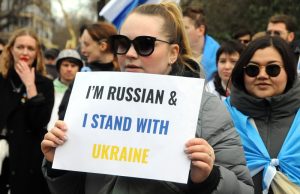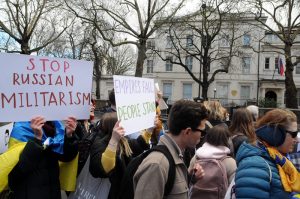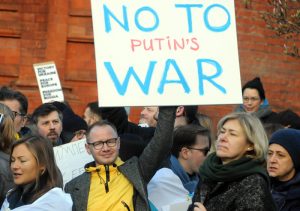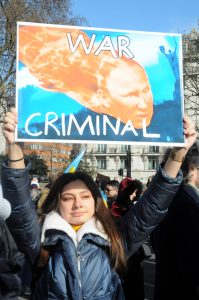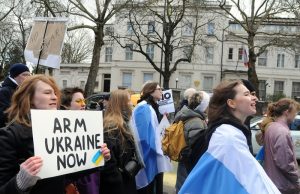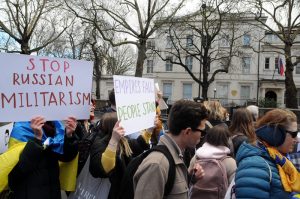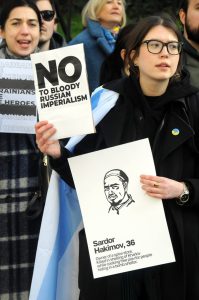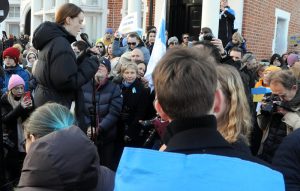This posting consists of two articles. The first is written by Ukrainian-Canadian socialist, John-Paul Himka, argues that there are still possibilities for democratic development in Russia. This article was first posted by the Ukraine Solidarity Campaign. The second by Peter Arkell describes a Russian emigre organised demonstration in London in support of Ukraine. It was first posted by Real Democracy.
In a previous contribution to the Ukraine Solidarity Campaign, I outlined how three historical moments of democratic transition in Russia were aborted and how the kind of centralized, repressive, and aggressive government represented by tsarism, Stalin, and now Putin has reasserted itself. I ended that piece with a question: Can Russia break out of this vicious political culture, or is it trapped in it forever?
I don’t have the answer, but it is difficult to deny the possibility that Russia could change course. It is impossible to predict the future. A Zionist pithily wrote to his brother, a Marxist: “Has history already been written and all that is left for us is only to perform it?” In this particular dispute, I side with the Zionist brother. There have been so many surprises in my lifetime. No one foresaw the Gorbachev reforms and their immense impact on Central and Eastern Europe, including the collapse of the USSR. I had no idea that Islamic State was to explode into history in 2014 or that Russia would invade Ukraine in that same year. I didn’t see Trump coming, nor the pandemic, nor Russia’s suicidal full-scale invasion of Ukraine in 2022. True, I’m a historian and therefore more comfortable in the analysis of the past, but of one thing I am sure: future developments will continue to surprise us. It seems hard to imagine at the moment, but even Russia might transform.
When the Ukrainian socialist theorist Mykhailo Drahomanov thought about democracy, he considered its essence to be freedom of speech, religion, assembly, and association. Today we would update that list, expanding rights and freedoms. Drahomanov was much less impressed by the representative side of democracy — the parliaments and senates and congresses. Following his lead, we should try primarily to imagine a Russia in which dissent is a legitimate part of discourse, in which government strives to provide all citizens with a peaceful and prosperous existence, and in which diversity is not only tolerated but recognized as beneficial to society.
This same ideal, as well as opposition to this ideal, exists in every country today. It is a question really of who has hegemony at a particular moment in a particular place, the democrats or the antidemocrats. In the USA, the ratio is something like 60:40 at present in favor of democracy. In Russia the ratio is probably something like 75:25 in favor of authoritarianism. But these ratios can and do change over time, sometimes with amazing rapidity.
There are certainly proponents of democracy both in Russia and among Russians abroad who have condemned Putin’s imperialist war against Ukraine. Aleksei Navalny, the brutally bullied and marginalized spokesperson of the democratic opposition within Russia, recently released a fifteen-point program that calls not only for the end of the war against Ukraine, but for the return to Ukraine of Crimea, Russian payment of reparations, and investigation of Russian war crimes. The singer and heart throb of the 1980s, Alla Pugacheva, declared her opposition to the war and had to leave the country last October. The Russian-American journalist and activist Masha Gessen, now based exclusively in the West, has long been a sharp critic of Putin’s policies and has in particular defended the rights of the extremely vulnerable LGBT+ communities in Russia. There is a Russian Canadian Democratic Alliance which regularly organizes demonstrations against the war in Ukraine. A Russian historian who spent some time at the University of Alberta, where I taught history, Tatiana Tairova-Yakovleva, wrote a protest supporting the Ukrainian resistance against Putin’s invasion. For her troubles, she was fired, forced into exile, and prosecuted in absentia. This list could go on and on. I only cite some cases that immediately pop to mind.
Ukrainians in favor of a democratic and just society, as well as their supporters abroad, should engage and work with the Russian opposition. It is vital that a strong current of anti-imperialism be solidified within Russian political thought, but that can only happen if the victims of Russian imperialism take an active role in explaining what imperialism is and cultivating an abhorrence of it.
The link between authoritarianism and the oppression of other nations has been clearly evident in contemporary history. Israel provides a good example of this, with its vicious circle of increasing repression of the Palestinians and decreasing democratic norms. The Soviet dictatorship also partly emerged to keep non-Russian nationalities in subordinate positions. Under Stalin, non-Russian nationalities – Poles, Ukrainians, ethnic Germans, Tatars, Chechens, and others – constituted, proportionately, the most numerous victims of terror, deportation, and other violence. And when the Soviet dictatorship collapsed in the late 1980s, when the lid was taken off the pressure cooker, it unleashed the independentist strivings of the non-Russian nationalities and destroyed the Soviet Union.
War has always produced change. In a further installment I hope to reflect on the chances that this evil war could be a catalyst for positive developments in Russia and among the general Russian public.
1.3.23
________
2. I’M RUSSIAN AND I STAND WITH UKRAINE
At least 700 Russians, calling for an end to the Putin regime, marched on Saturday to the Russian Embassy, in Notting Hill, London, where they held a rally. Chanting ““Victory for Ukraine, freedom for Russia”, “Stop Putin, stop the war” and “Putin is a War Criminal”, the protesters had to walk on the pavement as the police had refused to close the road.
The tightly-packed meeting directly opposite the embassy not 40 metres away was addressed by Marina Litvinenko, the widow of the murdered Russian defector, and by Mikhail Khodorkovsky, the former oligarch who spent 10 years in a Russian jail, and by several other high-profile speakers.
Khodorkovsky said Russians had completely different interests from Putin; “It`s Putin`s war, not the war of the Russian people”. He predicted the end of the war would mean the end of the Putin regime.
Marina Litvinenko, whose husband Alexander, was poisoned with radioactive polonium in London 15 years ago, almost certainly on the orders of Putin, spoke in Russian and called for a Ukrainian victory in the war. Only that would bring about the end of the Putin regime, with Russia being able to return to a normal relationship with the international community. She said she was surprised by the large turnout at such a protest.
Ksenia Maximova, one of the organisers of the campaign group, the Russian Democratic Society, told The Guardian, that the protest demonstrated the existence of a strong expatriate opposition to Putin and the war. She said that on a previous protest, the ambassador himself had emerged to film the people projecting the words “Russia is a Terrorist State” onto the front of the embassy.
28.2.23
__________
also see:-
Why Putin has invaded Ukraine, Part 1 – an examination of some contending views – Allan Armstrong
Why Putin has invaded Ukraine, Part 2 – a socialist republican analysis – Allan Artmstrong

